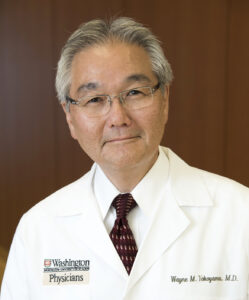A message from the Associate Dean

Physician-scientists are critical to advancing biomedical research, from their role in basic science discoveries to translating such findings to the clinic. Yet, the number of physician-scientists at the national level has been declining for decades. You wouldn’t notice this at Washington University because we have a long and storied history of training, nurturing, and developing outstanding physician-scientists at all career stages. However, we believe we can build on this strong foundation with innovative strategies to stem the national tide.
The Division of Physician-Scientists was established with the goal to enrich the national pipeline of physician-scientists by providing strong institutional support for their training and recruitment. Modeled after the Division of Biology and Biomedical Sciences that helped revolutionize graduate student training nearly 50 years ago, the Division of Physician-Scientists will bring together existing programs and develop new ones to further nurture the career development of physicians who treat patients and also want to conduct scientific research. We are committed to being broadly inclusive and will endeavor to enhance recruitment, training and retention of physician-scientists who are underrepresented in the physician-scientist pool, including women and persons of color.
With support from a Physician-Scientist Institutional Award from the Burroughs Wellcome Fund, the division’s first efforts will focus on MD-only trainees. A common perception is that earning an MD/PhD is the only route to becoming a physician-scientist. One of the goals of this new division is to show alternative routes for combining patient care and research. As an MD-only physician-scientist myself, I know the unique opportunities and barriers that this career path presents.
On this site you will find information about our programming and other resources at Washington University to support physician-scientists. The Dean’s Scholars program supports outstanding MD physician-scientists as they prepare to start their own independent research labs, The Interesting Patient Study (TIPS) gives residents and fellows the opportunity to use basic science resources to study their unusual patients, and the Community of Academic Physician Scientists in Training (CAPSiT), which will connect physician-scientists across the training continuum.
Please feel free to contact the division office if we can be of assistance.
Wayne M. Yokoyama, MD
Associate Dean, Division of Physician-Scientists
Sam J. and Audrey Loew Levin Professor